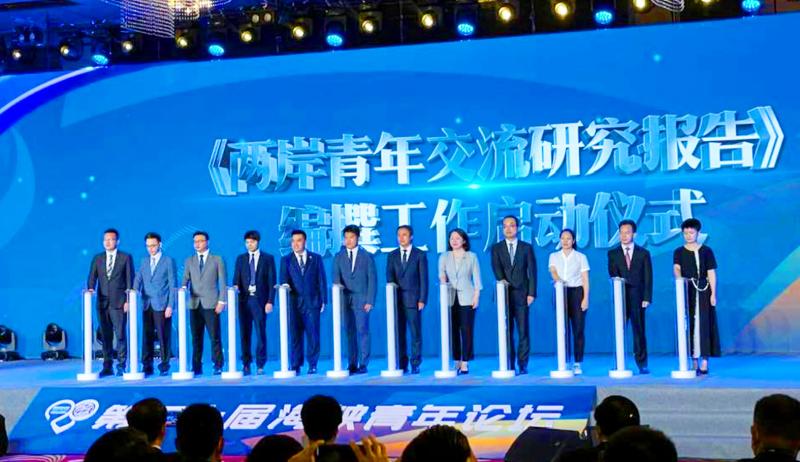Bejing’s promotion of cross-strait exchanges is nothing but propaganda and an attempt to poach Taiwanese talent, the Mainland Affairs Council (MAC) said yesterday after Chinese President Xi Jinping (習近平) urged young Taiwanese to support unification.
“I am glad to learn that young people from Taiwan have witnessed the rapid developments and changes of the motherland, and felt the warm feelings between compatriots from both sides of the Taiwan Strait who are all of the same family,” Xi told the Straits Youth Forum in Xiamen earlier yesterday.
The coorganizers of this year’s forum — the 20th iteration of the event — included the Chinese Communist Party’s All-China Youth Federation and the Chinese Nationalist Party’s (KMT) Department of Youth Affairs.

Photo: CNA
Young Taiwanese should join hands with their Chinese counterparts to “strive relentlessly for national rejuvenation,” Xi said.
In response, the MAC said that educational exchanges are part of Beijing’s campaign to gain political influence in Taiwan, but its promises are not made in good faith.
Citing Xi’s comment, the MAC said the Chinese leader pledged to “maintain the excellent conditions of academic exchanges across the Strait as before.”
Xi’s claim was undercut by the Chinese government in April 2020 unilaterally shutting down the path for Chinese students to study in Taiwan, it said.
“It is clear that China’s exchanges and proclamations of mutual benefits for young Taiwanese are nothing but propaganda to poach talent to fill capability gaps in its economy,” the MAC said. “Its claims of mutually beneficial exchanges are insincere.”
Information packets warning Taiwanese of the pitfalls of studying or working in China were published on the council’s Web page ahead of the forum, while domestic groups are urged not to become tools of Beijing, it said.
Democratic Progressive Party Legislator Wang Mei-hui (王美惠) said China is taking advantage of young first-time jobseekers with empty promises of economic opportunities.
Many Taiwanese investors have lost money in the Chinese market due to predatory state-sanctioned business practices, she said, adding that a society devoid of democracy and human rights can offer no advantages.
“Young people should be aware of the true conditions behind the facade in China,” she said. “As for the fatherland, one country on each side has long since been the reality for Taiwan and China.”

MAKING WAVES: China’s maritime militia could become a nontraditional threat in war, clogging up shipping lanes to prevent US or Japanese intervention, a report said About 1,900 Chinese ships flying flags of convenience and fishing vessels that participated in China’s military exercises around Taiwan last month and in January have been listed for monitoring, Coast Guard Administration (CGA) Deputy Director-General Hsieh Ching-chin (謝慶欽) said yesterday. Following amendments to the Commercial Port Act (商港法) and the Law of Ships (船舶法) last month, the CGA can designate possible berthing areas or deny ports of call for vessels suspected of loitering around areas where undersea cables can be accessed, Oceans Affairs Council Minister Kuan Bi-ling (管碧玲) said. The list of suspected ships, originally 300, had risen to about 1,900 as

Japan’s strategic alliance with the US would collapse if Tokyo were to turn away from a conflict in Taiwan, Japanese Prime Minister Sanae Takaichi said yesterday, but distanced herself from previous comments that suggested a possible military response in such an event. Takaichi expressed her latest views on a nationally broadcast TV program late on Monday, where an opposition party leader criticized her for igniting tensions with China with the earlier remarks. Ties between Japan and China have sunk to the worst level in years after Takaichi said in November that a hypothetical Chinese attack on Taiwan could bring about a Japanese

MORE RESPONSIBILITY: Draftees would be expected to fight alongside professional soldiers, likely requiring the transformation of some training brigades into combat units The armed forces are to start incorporating new conscripts into combined arms brigades this year to enhance combat readiness, the Executive Yuan’s latest policy report said. The new policy would affect Taiwanese men entering the military for their compulsory service, which was extended to one year under reforms by then-president Tsai Ing-wen (蔡英文) in 2022. The conscripts would be trained to operate machine guns, uncrewed aerial vehicles, anti-tank guided missile launchers and Stinger air defense systems, the report said, adding that the basic training would be lengthened to eight weeks. After basic training, conscripts would be sorted into infantry battalions that would take

DEEP-STRIKE CAPABILITY: The scenario simulated a PLA drill that turned into an assault on Taiwan’s critical infrastructure, with the launchers providing fire support Taiwan yesterday conducted this year’s first military exercises at Longsiang Base in Taichung, demonstrating the newly acquired High Mobility Artillery Rocket System’s (HIMARS) ability to provide fire support and deep-strike capabilities. The scenario simulated an attack on Penghu County, with HIMARS trucks immediately rolling into designated launch areas and firing barrages at the Wangan (望安) and Cimei (七美) islands, simulating the provision of fire support against invading forces. The HIMARS are supposed to “fire and leave,” which would significantly increase personnel and equipment survivability, a military official said. The drill simulated an exercise launched by the Chinese People’s Liberation Army (PLA) Eastern